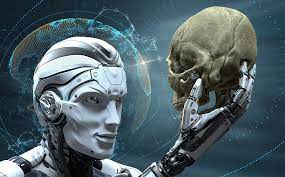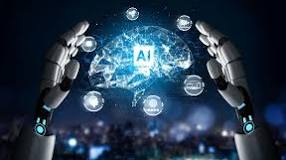The Rise of AI: Transforming Industries and Everyday Life
Artificial Intelligence (AI) is no longer a futuristic concept; it is an integral part of our daily lives, reshaping industries and redefining the way we interact with technology. From automating mundane tasks to making complex decisions, AI is taking over in ways that were once unimaginable.
AI in Various Industries
AI’s impact can be seen across multiple sectors:
- Healthcare: AI is revolutionizing healthcare by enhancing diagnostic accuracy, personalizing treatment plans, and predicting patient outcomes. Machine learning algorithms analyze vast amounts of medical data to identify patterns and provide insights that improve patient care.
- Finance: In the financial industry, AI algorithms are used for fraud detection, risk assessment, and algorithmic trading. These systems can process transactions faster and more accurately than their human counterparts.
- Manufacturing: AI-driven automation in manufacturing increases efficiency by optimizing production lines and reducing downtime through predictive maintenance.
- Retail: Retailers use AI for personalized recommendations, inventory management, and customer service chatbots that enhance the shopping experience.
The Benefits of AI Integration
The integration of AI into various sectors offers numerous benefits:
- Increased Efficiency: By automating repetitive tasks, AI allows human workers to focus on more strategic activities.
- Improved Accuracy: With its ability to process large datasets quickly, AI reduces errors in decision-making processes.
- Cost Savings: Automation leads to reduced operational costs by lowering the need for manual labor in certain areas.
The Challenges Ahead
Despite its advantages, the rise of AI also presents challenges that need addressing:
- Job Displacement: As machines take over routine tasks, there is a growing concern about job displacement. Reskilling programs are essential to prepare the workforce for new roles created by technological advancements.
- Ethical Considerations: The use of AI raises ethical questions about privacy, bias in algorithms, and accountability. Establishing clear guidelines and regulations is crucial to ensure responsible use of technology.
- Lack of Transparency: Many AI systems operate as “black boxes,” making it difficult to understand how they reach certain decisions. Increasing transparency will be important for building trust with users.
The Future of AI
The future promises even greater advancements in artificial intelligence. As technology continues to evolve at a rapid pace, it will be essential for society to adapt alongside it. By embracing both the opportunities and challenges presented by AI, we can harness its full potential while ensuring ethical considerations are at the forefront.
The era of AI taking over is not just about machines replacing humans but rather enhancing human capabilities and creating new possibilities that were once beyond our reach.
Exploring the Timeline and Risks of AI Takeover: Frequently Asked Questions
- What Year Will AI take over?
- Will AI takeover by 2050?
- What is the risk of AI taking over?
- Will AI takeover by 2030?
- How long do we have until AI takes over?
- Is AI takeover possible?
What Year Will AI take over?
The question of when AI will “take over” is a topic of much debate and speculation among experts and futurists. While there is no definitive answer, many agree that AI will continue to evolve rapidly in the coming decades. Some predict that by the mid-21st century, AI could surpass human intelligence in specific areas, leading to significant advancements in technology and society. However, the concept of AI “taking over” suggests a level of autonomy and control that may not align with current technological trajectories or ethical considerations. Instead, it is more likely that AI will increasingly integrate into various aspects of daily life and industry, augmenting human capabilities rather than completely replacing them. The timeline for these developments remains uncertain and will depend on technological breakthroughs, regulatory frameworks, and societal acceptance.
Will AI takeover by 2050?
The question of whether AI will take over by 2050 is a topic of much debate among experts and futurists. While AI is expected to become increasingly integrated into various aspects of daily life and industry, a complete takeover is unlikely. By 2050, AI will likely have advanced significantly in terms of capabilities and autonomy, but it will still function as a tool designed to augment human abilities rather than replace them entirely. Ethical considerations, regulatory frameworks, and the need for human oversight are expected to guide the development and deployment of AI technologies. Therefore, while AI will play a more prominent role in society by 2050, it is anticipated to do so as a complement to human effort rather than as a dominant force.
What is the risk of AI taking over?
The risk of AI taking over primarily revolves around concerns related to autonomy, control, and ethical implications. While AI systems are designed to enhance efficiency and decision-making, there is apprehension about their potential to operate beyond human oversight if not properly managed. The fear is that highly autonomous AI could make decisions that conflict with human values or lead to unintended consequences. Additionally, there are concerns about job displacement as AI automates tasks traditionally performed by humans. Ethical considerations also emerge regarding bias in AI algorithms and the privacy of data used by these systems. To mitigate these risks, it is crucial to establish robust regulatory frameworks, prioritize transparency in AI development, and ensure continuous human oversight in critical decision-making processes.
Will AI takeover by 2030?
The question of whether AI will take over by 2030 is a topic of much debate and speculation. While AI is expected to become increasingly integrated into various aspects of life and industry, a complete takeover by 2030 is unlikely. AI technologies are advancing rapidly, enhancing efficiency and productivity across sectors like healthcare, finance, and manufacturing. However, these systems still require human oversight and decision-making, especially for complex tasks that involve ethical considerations and nuanced judgment. Instead of a full takeover, it’s more plausible that AI will serve as a powerful tool that complements human capabilities, leading to new opportunities and challenges in the workforce. The focus will likely be on collaboration between humans and machines rather than replacement.
How long do we have until AI takes over?
The question of how long we have until AI “takes over” is complex and depends on what “taking over” means. If it refers to AI systems surpassing human intelligence across all domains, often called artificial general intelligence (AGI), experts have varying predictions. Some believe it could happen within a few decades, while others think it may take much longer or might never occur. Currently, AI excels at specific tasks but lacks the broad understanding and adaptability of human intelligence. While AI continues to advance rapidly, significant technological and ethical challenges remain before it could potentially “take over.” It is crucial for society to focus on responsible development and regulation of AI technologies to ensure they complement rather than dominate human activities.
Is AI takeover possible?
The question of whether an AI takeover is possible often sparks intense debate among experts and the public alike. While AI has made significant strides in automating tasks and enhancing decision-making processes, the notion of a complete takeover remains speculative. Current AI systems are designed to perform specific tasks and lack the general intelligence that humans possess. Moreover, ethical guidelines and regulations are being developed to ensure AI technologies are used responsibly. While there are legitimate concerns about job displacement and ethical considerations, the idea of AI gaining autonomous control over human affairs is not supported by current technological capabilities or foreseeable advancements. Instead, AI is more likely to continue as a powerful tool that complements human efforts rather than replacing them entirely.


